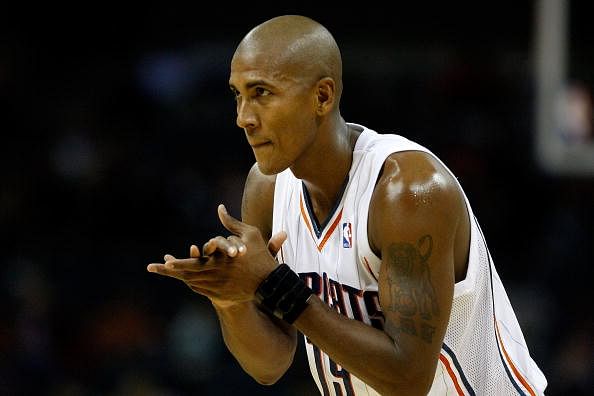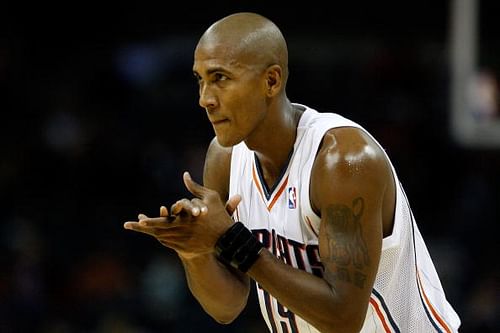
NBA star Raja Bell: There is no reason why Indian kids can’t make it to the NBA

The name may not ring a bell among many basketball followers in India, but Raja Bell is no run of the mill NBA player. Through a solid 12 year pro career, he has established himself as a premier perimeter defensive stopper and reliable 3 point shooter. Raja was in India from July 12th to 17th as one of the latest in the bandwagon of NBA stars to visit the country. He ran clinics in New Delhi at the Montfort School, Ashok Vihar, and later at the Indira Gandhi Indoor Stadium for the India junior and senior teams. I caught up with him after he completed an engaging 1 hour session with the kids from Montfort School, where he taught them the basics of a good defensive stance and took them through some shooting drills. Here’s the video of the interview followed by the Q& A transcript.
*Apologies for the poor video quality. Only the first half of the interview has been uploaded*
G: You’ve just interacted with these kids. Do you think they are on par with equivalent 10-12 year olds back in the US?
Raja: I think they are right in the same ball park. They seem to pick up skills and stuff very quickly. There was a whole lot of demonstration today and they were picking it up very quickly. That is impressive. Kids in the states get the benefit of watching 10-20 games a week. So you can tell that they have seen more basketball probably…but as far as skill level goes and being able to pick things up, they are right on par.
G: These days, a lot of kids in India follow the NBA. And with the Internet boom they get to see so much and sort of know in real time what’s happening (in the NBA). So do you think that shows in terms of their knowledge of the game? Do you think they have picked up their skills from the internet?
Raja: Yeah…I think the Internet today for any kid in any country is a great tool. Even for me you know, I can pick out breakdown videos of Kobe shooting a jumpshot. I think they (these kids) have been taught skills from their coaches at various levels and from these junior WNBA/ junior NBA programs. You can see that they understand the fundamentals and that they have been taught the fundamentals which is important.
G: Ok… I hate to bring this up, but all NBA fans in India, including me, sort of remember you for that one incident with…
Raja (smiles): Kobe? Yeah…
G: Yeah…the clothesline (In a tense 2006 playoff game between the Suns and the Lakers, Raja Bell who was playing for the Suns, clotheslined Kobe and was subsequently ejected from the game). But in the context of that game, what I actually wanted to ask you about was defense. Because a lot of what happened in that game was, in a sense, an extension of defense, about being aggressive. So how do you know when to draw the line between being aggressive…and getting a technical?
Raja: Yeah… that’s a hard line to draw…it (really) is. Because you know most coaches with me gave me a little bit of freedom to get technical fouls because my job is very emotional. I have to be able to go out there and really really fight with this guy all night long physically. So there are going to be points where it all boils over. But as I’ve got older, I’ve gotten a lot better at understanding where that line is and to try not to cross it. But you know, anybody whose job it is to go out there and be emotional all night, there are going to be times when you cross the line.
His Early Years
G: From what I’ve read about you, it has never been easy for you, even when you were in College. I think you were in Boston (University) for a year and then there were some problems and you had to switch colleges and you went undrafted. So how did you deal with that? Especially as you performed pretty well in the NCAA, even winning a Conference Title…
Raja: I just roll with the punches man…you can’t get too down…you try not to. You always realize that if you continue to play and continue to make use of opportunities, so the next one might work out for you. So you just keep on going.
G: Was it tough for your family as well? That you were not picked?
Raja: No, I don’t think any of us really thought that I might play in the NBA, so I don’t know if anybody was super disappointed. We were just happy that I got to play with the Atlanta Hanks in training camp, and I was happy I got a tryout with the Spurs. So every step along the way was good for me.
Playing with Iverson and Nash
G: …And the first team you joined…I think it was the (Philadelphia) 76ers…and then you also played with the (Phoenix) Suns. Both these teams had these two great point guards…very different but in their own right they were great: Allen Iverson and Steve Nash. How were they in the locker room? How did they approach a pre-game?
Raja: I mean they were both kinda quiet man…in the locker room at least. Neither one was in your face or telling you that you had to do it one way. But you knew when you got onto the court with both of them that they were going to be there to fight all the way. Whether you were up 20 or down 20 or winning or losing…that’s how they led by example and not necessarily by speech.
On Defense
G: Were you always so keen on defense? Because the highlight reel is always going to be the dunk, the clutch play or maybe a block. So why defense? Is there something about your mindset that you know you want to play defense, or is it that you see Kobe Bryant and there is something about you that wants to shut him down?
Raja: I saw a job (a long pause). There are a lot of people that score in the NBA…but when I got there, it wasn’t my job to score, so I had to be smart enough to figure out what role would let me keep the job. With defense, when I realized that that was a job that everybody needed to do, it became kind of my calling card.
G: Did you have a role model when it came to defense? Maybe Bill Russell or…
Raja: No. I didn’t pattern it after anybody. You know what? I always thought of myself as an underdog…as somebody who had to work hard at it.
G: You are also a solid 3 point shooter. You even led the league once in 3s in the 06-07 season. That’s an interesting combination don’t you think: Defense and 3 pointers? Because fundamentally these 2 disciplines require completely different mindsets: For defense you need to be aggressive and in your face; for shooting you need to be relaxed and loose to get a nice follow through. How do you manage that mental switch from defense to offense and vice versa?
Raja: That’s an interesting question….but you know, sometimes when my defense is good, it rubs off on my offense. I get into the zone you know. Initially when I came in, I was more athletic, but then I realized that to score in the league I had to shoot.
G: Who is the toughest guy you have had to guard?
Raja: Kobe is the toughest because he can score in so many ways. Manu Ginobili as well because he is left-handed and a very unorthodox player. Ray Allen when he used to play for Seattle…because he used to run around all those screens to get free for his shot. Also Wade and Lebron. LeBron is like a bull …. His sheer physicality makes it a tough match up.
G: What’s your take on trash talking? Do you think it a valid part of playing defense? Because I don’t know who it was, maybe Bill Russell, who said that there are three ways you can play defense: 1) Physically; 2) Skillfully; 3) Psychologically—getting under the skin of the opponents. So do you subscribe to the third method? Of playing defense psychologically—by talking trash?
Raja: You need to back it up (if you are going to talk trash). Personally, I’m not into trash talking. I’m more physical….I can’t talk trash and still perform.
Predictions for the Olympics (At the time of this interview, the ’12 Olympics hadn’t begun. USA went on to win their 2nd straight gold, beating Spain 107-100)
G: This is the Olympic year. Who’s going to win this time? The international game has gotten so much better over the years. You think Spain can pull an upset?
Raja: I doubt that…there will always be match-up problems against the US. I mean they have Kobe, Lebron, Durant, Paul, Anthony…and the athleticism of Iguodala!
G: What is your take about the direction in which the NBA is headed? Earlier there was a sense of loyalty among players, where they stuck it out with a single franchise. Jordan was with the Bulls for 6 years before he led them to their first ring. Reggie Miller spent his entire career with the Pacers and never won a ring. Today, it seems this sense of loyalty has been replaced with simply a desire to collect as many rings as possible, with players willing to change teams at the drop of a hat. Is this harming the league: the change in focus from the “team” to an “individual”?
Raja: I’m a realist. I think it’s fine. It is not necessarily a question of loyalty. I would flip the script: if you are not performing, you would rather leave than stick around (and wait to be dropped from the team). So it is understandable if the player wants to use the system (to his advantage).
On His Free Agency
G: You yourself are known as a “journeyman” player, having played for multiple franchises in your career. You are a free agent now. Have you worked out which team you are going to play for next year?
Raja: I haven’t decided yet. My agent is working on it. Kobe and I had a chat about playing with the (Los Angeles) Lakers. OKC (Oklahoma City Thunder), (Chicago) Bulls and New York (Knicks) are all likely destinations.
G: Finally, do you think it is realistically possible to see an Indian in the NBA in the future? Because from your training camp a short while back, it seems that we are still trying to learn the fundamentals, and we have not really moved on to advanced drills…
Raja: There is no reason why one of these kids can’t make it to the NBA someday. It’s just about doing the work. That’s why the NBA has come to India. We wouldn’t be here if we didn’t think basketball had the potential to become the number 2 sport in this country.